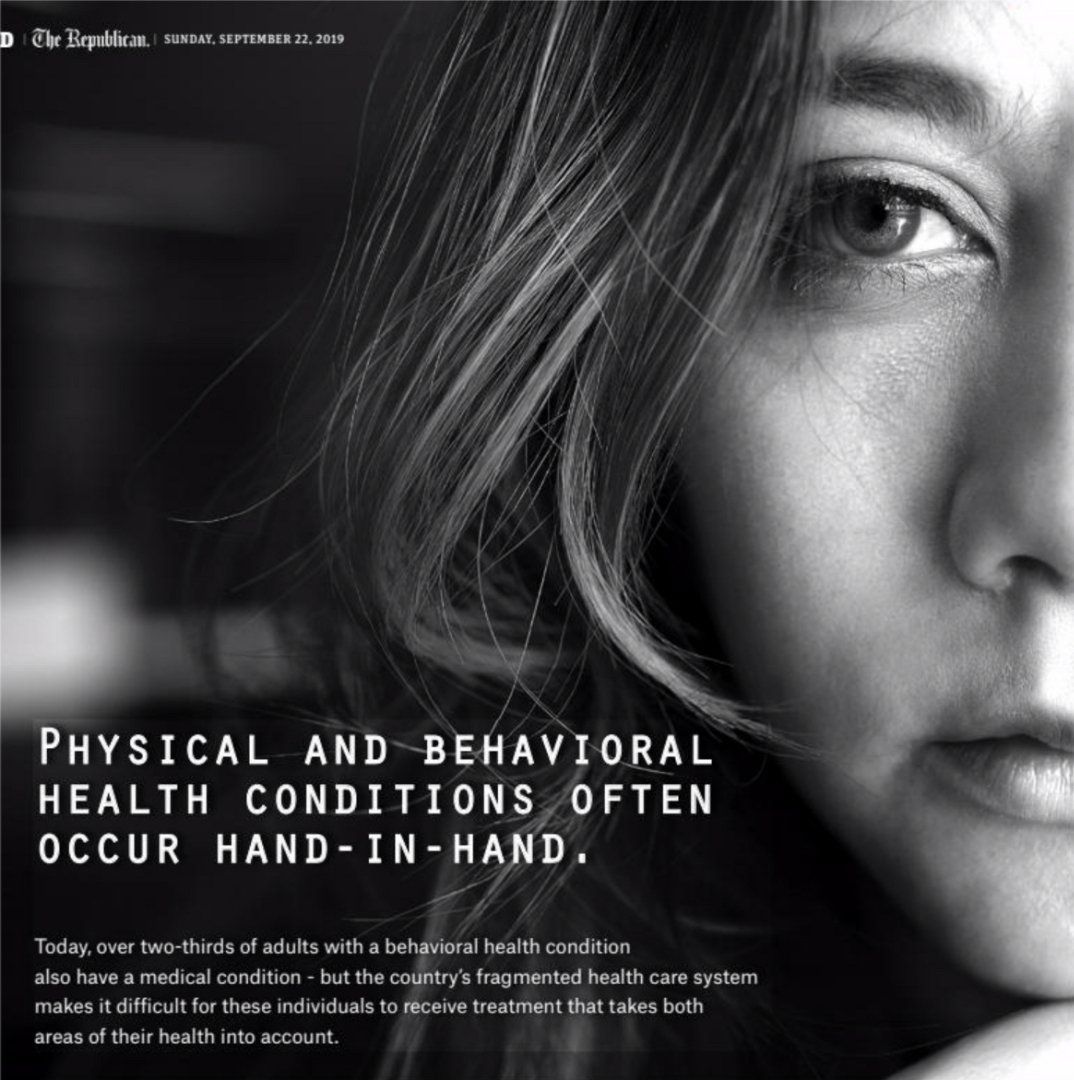BHN in the Media: Better Health
Having the different aspects of their healthcare scattered among various medical providers can reduce the effectiveness of an individual’s overall care and significantly raise their medical costs.
For over a decade, linking individuals’ physical and behavioral healthcare has been at the heart of Behavioral Health Network’s mission. For the past two decades, the rate of co-occurring medical and behavioral health conditions has increased dramatically around the globe, especially among children, teens, and the elderly. In order to more effectively treat individuals with co-occurring conditions, BHN is among a growing number of nonprofits working to implement a “whole health” model by partnering with primary care providers to ensure that all of an individual’s conditions, medical or behavioral, are considered when creating a treatment plan. This approach largely centers on integrating behavioral health services into primary care locations to make it easier for doctors to connect patients to these services.
“For the past ten years, we’ve been looking at how to be an integral part of healthcare as a system,” said Kathy Wilson, the chief executive officer and president of BHN. “Now, we work with healthcare providers as partners. Doctors need us, and we need them. We make sure we focus on the whole person, and not just the disease.”
The whole healthcare model is based on the Institute for Healthcare Improvement’s “Triple Aim” framework, which proposes a three-pronged solution to modify the current healthcare system: 1) improving patient experience in terms of quality and satisfaction; 2) improving the population’s overall health; and 3) reducing individual healthcare costs. The Institute also promotes the expansion of primary care to include behavioral healthcare and social services to ensure individuals’ needs are effectively met at the lowest possibly out-of-pocket cost.
For the past few years, Massachusetts has been supporting an initiative to incorporate the Institute’s ideas into the state’s healthcare system, which has helped BHN secure support and funding to develop programs and services that embrace a more effective and worthwhile structure of healthcare, Wilson said.
Under Wilson’s direction, BHN has focused its efforts on implementing the Triple Aim framework into its services. The agency has developed several programs that involve medical organizations, such as Baystate Health and Holyoke Health Center, in individuals’ care. At each partner site, BHN employees are available to help patients who share concerns about their mental health or substance use with their doctor.
“A doctor may determine that their patient needs a behavioral health specialist to work on things that are contributing to the patient’s challenges managing their physical health,” Wilson said. “So we begin to wrap a team of people around them to try and treat the whole individual rather than just one aspect of their health.”
Care teams involve staff members from both the primary care provider and from BHN, and can include clinicians, recovery coaches, care coordinators, nurses or medical assistants, depending on the patient’s needs. BHN’s behavioral health specialists can assist individuals in managing a variety of behavioral conditions, including substance use disorders or mental illnesses such as depression and anxiety.
When a doctor at one of the sites — Baystate Health, for instance — decides that their patient needs additional behavioral healthcare, they direct them to one of BHN’s on-site behavioral health specialists, said BHN Vice President Jessica DeFlumer-Trapp. The specialist then conducts a brief evaluation and decides what course of action will be most helpful in improving the patient’s behavioral health, whether it’s providing them with a referral to one of BHN’s programs or supplying them with community resources and self-therapeutic techniques.
“Sometimes it’s as simple as having a therapist at the doctor’s office for a couple of days each week so the doctor can refer patients to them,” DeFlumer-Trapp said. “And sometimes it’s as intensive as having the behavioral health specialist serve as a member of the doctor’s team and work directly with the primary care provider in a patient’s treatment.”
BHN has also developed a range of programs outside of these primary care sites that blend together patients’ physical and mental healthcare. Behavioral health specialists, such as outpatient clinicians, home health aides and care managers, work together to act as a “wraparound” support system for individuals that addresses any gaps in their treatment plans. For individuals with substance use disorders, BHN offers detox programs and residential recovery homes. BHN has also implemented services based on the state’s Children’s Behavioral Health Initiative that address children’s behavioral health needs at all ages, both at home and at school.
According to DeFlumer-Trapp, BHN’s increasing focus on integrating behavioral healthcare with physical wellness has developed in response to changes in how healthcare is viewed in the professional world.
“Behavioral health has been evolving over a long period of time,” she said. “BHN decided about ten years ago to focus its energies on how it could integrate services and help people care for their whole selves, long before most other agencies were thinking about that idea. So, we strategically began to identify partners and work with primary care sites to see how we could do things differently together.”
Changes to the current healthcare system are especially critical for those with co-occurring mental health and medical conditions. Studies have shown that individuals with a behavioral health condition die an average of 25 years earlier than the rest of the population, DeFlumer-Trapp said.
“These deaths are typically because of their physical health conditions, and not because of the things that people would think,” she said. “It’s not suicide, and they’re not necessarily dying because of their mental illness. Sometimes they are dying because of substance use disorders — things like overdoses, or infections they get as a result of being a long term drug user. But the overarching piece is that many people have really significant chronic co-morbid medical conditions with their behavioral health conditions.”
In many cases, an individual’s mental illness or addiction contributes to the development of a medical condition such as diabetes, hypertension or heart disease, DeFlumer-Trapp said. For example, older medications once used to treat mental illnesses have been linked to the development of metabolic conditions such as diabetes. Other individuals turn to smoking or alcohol as a coping mechanism for their mental health condition, which can cause them to develop a wide range of chronic physical illnesses. Studies have also found that mental illness can increase an individual’s likelihood of becoming obese, which consequently boosts their risk of developing additional medical conditions.
For many individuals with a mental illness, poverty also contributes to medical conditions that they have difficulty managing. Social determinants of health, or economic and social conditions that affect an individual’s ability to manage their health, play a significant role in the lives of many low-income individuals with co-morbid conditions. According to DeFlumer-Trapp, behavioral health conditions disproportionately occur in low-income individuals, and their limited access to resources or the environment they live in can further complicate individuals’ overall health.
“We know that the foundation of better healthcare is making sure you can meet everybody’s needs,” DeFlumer-Trapp said. “So we bring in additional programs and work collaboratively with community organizations to make sure that, when people have issues beyond what you think when you think of healthcare, there are support groups for them and they have access to anything and everything they might need in order to be able to get them further up the hierarchy of needs. When a person shows up for help, a primary care provider might bring in someone who can help the person access community resources. That may involve giving people information about how to access the local food bank, or connecting them to a housing authority or a resource to help them apply for subsidized housing. When a person isn’t getting their basic needs met, it’s really hard for them to do things like eat healthy and exercise, which can impact their physical health.”
According to Steve Winn, BHN’s Chief Operating Officer, in addition to screening for physical or behavioral illnesses, BHN now evaluates individuals to determine the impact that these societal factors may have on their health. “The social determinants of health include things such as housing, employment and nutrition,” Winn said. “If those kind of things are a problem, a person isn’t going to be able to focus their attention on improving their health. They aren’t going to be going to therapy, they aren’t going to be keeping their appointments and they aren’t going to be able to take care of themselves. An individual with diabetes needs to eat healthy foods, exercise regularly and take medication to remain healthy; but if they are homeless and struggling with untreated depression, it may be difficult for them to fulfill all of these requirements. Unfortunately, many of the people that we work with don’t have the resources to take control of their health. So we offer ways to help them overcome the social determinants that may limit them. We can help someone struggling to find housing, or connect someone to job training to help them get employed. For someone who needs to exercise, we can help them get a gym membership or provide them with bus passes to help them travel to a safe place to exercise, like a park. We have lots of partners in many different areas.”
The current healthcare model, which forces individuals to receive services for different health conditions at multiple care providers, is also needlessly expensive for those with both a medical and behavioral health condition, Winn said. Studies show that medical costs are dramatically higher for individuals who have a behavioral illness in addition to a medical condition. One study found that the treatment of individuals with both behavioral and medical conditions cost Americans a total of $406 billion in additional healthcare costs in 2017.
The high cost of receiving behavioral healthcare in addition to treatment for physical conditions can act as a barrier for individuals to seek treatment for their mental condition. The whole health model utilized by BHN helps to reduce these costs by focusing on treating the whole individual rather than treating their different health conditions in isolation. Wilson stated that whole healthcare is very empowering for individuals who may have traditionally felt helpless in their own health management. Introducing individuals to the resources and medical providers they need to improve their health allows them to take control of their health in ways they previously were denied.
“Integrated care requires individuals to take a look at more than just taking a pill every day,” Wilson said. “It’s really trying to manage people’s behavior and give them some controls over their health. If you’ve never been taught what nutritious eating for diabetes looks like, we’ll come to your house and get you the information you need to know to make your eating healthier. It’s really about changing behaviors.”
BHN’s work in whole healthcare over the past decade is only the beginning of the agency’s mission of playing a role in reshaping the state’s healthcare system, according to Wilson. Wilson plans to continue partnering with healthcare organizations in the future to ensure individuals receive the most effective and affordable treatment possible. BHN aims to improve as many individuals’ lives as it can — and the whole healthcare model makes that goal much more attainable.
“It’s really all about working collaboratively on improving healthcare to help individuals change their lives in a way that gives them the kind of life that they deserve,” Wilson said. “Our vision is to create partnerships and secure funding that allow us to create opportunities for people to get the kind of treatment they need.”
SHARE
Topics

Stay Up to Date!
Sign-up for our newsletter to receive news and updates from BHN.





